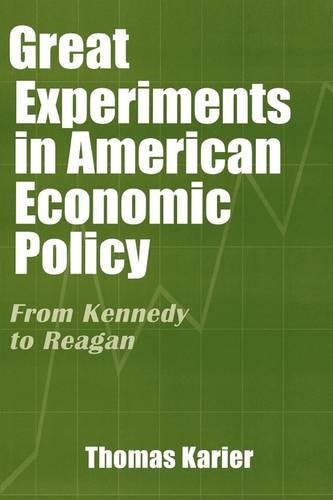
Great Experiments in American Economic Policy: From Kennedy to Reagan
(Paperback)
Available Formats
Publishing Details
Great Experiments in American Economic Policy: From Kennedy to Reagan
By (Author) Thomas Karier
Bloomsbury Publishing PLC
Praeger Publishers Inc
30th January 1999
United States
Classifications
Tertiary Education
Non Fiction
Economic history
History of the Americas
338.973
Physical Properties
Paperback
248
Description
During the 1980s, dramatic changes in the federal budget, the Federal Reserve, and the U.S. Treasury initiated the most comprehensive series of economic experiments since the 1930s. This book describes the nature of those experiments and compares them to the Keynesian experiment of the 1960s. The promises that the economic experimenters made in the 1980s were bold and confident: monetarists claimed their policies would permanently subdue inflation and unemployment; supply-siders said their tax cuts would give the economy new life with accelerated growth and a balanced budget; and free floaters promised unprecedented stability in international markets. Actual results fell far short of these ambitious promises. At first the economists denied that their experiments had failed, but when they were faced with overwhelmingly negative results that were impossible to ignore, they blamed each other for the failure. After beginning the decade as a united front against liberalism, the monetarists, suppply-siders, and free floaters ended the decade hopelessly divided. This book sorts out the actual occurrences of the 1980s. It analyzes why events unfolded as they did, what bearing the results have on the future of economics and the U.S. economy, what can be explained, and what mysteries remain.
Reviews
"[This book] offers an important and impressive comparison between the innovative economic policies of the Kennedy administration and the controversial experiments of the Reagan administration. Professor Karier does a superb job of presenting the central ideas of Keynesians, monetarists, supply-siders, and free-floaters and then tracing their successes and failures during the decades of the 1960s and 1980s. This is a valuable book for anyone trying to understand the economy and the role of economic experiments. In addition, it will provide an excellent supplement for any undergraduate course in macroeconomics."-Clair Brown Professor of Economics and Director, Institute of Industrial Relations University of California, Berkeley
"Karier has produced a masterful history of three costly experiments in macroeconomic policy in the 1980s. His book will be an invaluable aid to students in macroeconomics courses who want to see behind diagrams and models to what it is really all about. The book is lucidly written with often wonderful turns of phrase. It brings macroeconomics alive by deftly teaching the concepts and principles of macroeconomics in connection with history. An excellent treatment of the past that is still with us, it is fair and objective. Professional economists will also find that this book refreshes their knowledge of this important period."-John B. Davis Associate Professor of Economics Marquette University
Thomas Karier argues that economics, although not usually regarded as an experimental science, occasionally produces speculative policy prescriptions that amount to experiments....He targets monetarism, supply-side economics, and free-floating exchange rates--three examples from the 1980s--as experimental because their proponents presented them as hypotheses to be tested....At a time when a highly touted new textbook in introductory economics leaves discussion of Keynes to the last chapter, Karier's readable volume is welcome. Students of macroeconomics will profit from his analysis and conclusions.-Business Library Review
"Thomas Karier argues that economics, although not usually regarded as an experimental science, occasionally produces speculative policy prescriptions that amount to experiments....He targets monetarism, supply-side economics, and free-floating exchange rates--three examples from the 1980s--as experimental because their proponents presented them as hypotheses to be tested....At a time when a highly touted new textbook in introductory economics leaves discussion of Keynes to the last chapter, Karier's readable volume is welcome. Students of macroeconomics will profit from his analysis and conclusions."-Business Library Review
Author Bio
THOMAS KARIER is Associate Dean and professor of Economics at Eastern Washington University. Since 1989 he has served as research associate for the Jerome Levy Economics Institute in Annandale, NY, where he has published several policy briefs on contemporary economic policy. He has published in several journals and is the author of Beyond Competition: The Economics of Mergers and Monopoly Power (1993).
